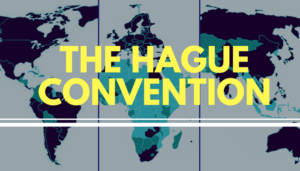International child abduction in Brazil comprises cases in which the removal of a child by one of the joint holders of custody or non-custodial or contested parents to Brazil in contravention of other laws of other countries and/or the desires of other custody claimaints. The phenomenon of international child abduction is defined in international law and legislated on by the Hague Convention on the Civil Aspects of International Child Abduction, which entered into force in Brazil on January 1, 2000 and aims to trace abducted children, secure their prompt return to the country of habitual residence and organize or secure effective rights of access. In 2010 Brazil was accused by the US State Department of being non-compliant with the Hague Convention.
The International Centre for Missing & Exploited Children (ICMEC), a nonprofit global organization that combats child sexual exploitation, child pornography, and child abduction, has a regional presence in Brazil.
Brazilian non compliance with hague convention
Articles 12 and 13
Accusations that Brazil does not comply with the Hague Convention hinge on conflicting interpretations of Article 12 and Article 13 of the Convention. According to Article 12, “The judicial or administrative authority, even where the proceedings have been commenced after the expiration of the period of one year […] shall also order the return of the child, unless it is demonstrated that the child is now settled in its new environment,” It is the second part of this article that is used as a defence in all Hague disputes in Brazil and one of the reasons why they are held up for so long. Brazilian federal courts routinely accept evidence from Brazilian abducting parents to the effect that the abducted child has become settled in his/her new environment and the U.S. State Department has claimed that Brazilian Courts erroneously treat Hague cases as custody disputes, unnecessarily delaying cases and demonstrating an unfair bias toward Brazilian citizens, especially mothers. In addition to this, Article 13 of the Convention states, “The judicial or administrative authority may also refuse to order the return of the child if it finds that the child objects to being returned and has attained an age and degree of maturity at which it is appropriate to take account of its views,” while Article 13(b) states that children should not be returned to their habitual residence if “there is a grave risk that his or her return would expose the child to physical or psychological harm or otherwise place the child in an intolerable situation.” Brazilian abducting parents often present evidence to the court in the form of statements from the abducted child to the effect that they wish to stay in Brazil. A 1999 report by Prof. Nigel Lowe of the Cardiff University Centre for International Family Law Studies in the U.K. raised concerns about children not being returned to their place of habitual residence because of a misunderstanding of what the term ‘habitual residence’ meant (i.e., rather than referring to restoration of the status quo ante the abduction, abducting parents argue that it refers to the status quo and they are more likely to be able to argue this point if they can delay the judicial process long enough). Lowe states, “courts need also to consider any undue parental influence on the child, either through deliberate indoctrination by the abducting parent or simply by the natural inclination of many children to support a present parent against an absent parent.” The report stresses that abducted children’s wishes should not override the spirit and the intent of the Convention and implies that the part of Article 13 that affirm “The judicial or administrative authority may also refuse to order the return of the child if it finds that the child objects to being returned and has attained an age and degree of maturity at which it is appropriate to take account of its views.” should be considered null and void by making that part of the Article not have any use, because for children to be considered to have the maturity to decide where they want to be they should have reached the age of 16 – the cut-off point for Hague Convention cases.
The slowness of the Brazilian judicial process and the checks and balances built into the post-military-dictatorship Constitution of Brazil as a means of safeguarding human rights also create a long appeals process which means that once a child is abducted to Brazil it is likely that he/she will remain there in cases that the judges feel that this is the best solution for the child until they reach the res judicata. The hierarchical position of international conventions in the Brazilian legal system is less than the Constitution of Brazil and can not contradict it, which means that in cases where it is alleged that the convention is contrary to a constitutional principle, the convention may not be applied in whole.
The U.S. Department of State 2008 Report on Compliance with the Hague Convention says: “Brazil continued to demonstrate patterns of noncompliance with the Convention in its judicial performance. The USCA notes several instances during FY 2007 in which Brazilian courts treated Convention cases as custody decisions, rather than applying the principles of wrongful removal or retention laid out in the Convention. In two cases, Brazilian judges refused returns to the United States, citing the “best interests of the child” in accordance with Article 227 of the Constitution of Brazil. These decisions contradict the Convention, because the concept in the Brazilian legal system of “best Interests of the Child” is broader than the narrow concept described in the Convention, as the Preamble of the Convention declares that the interest of children is attained through their return to their country of habitual residence. In addition, the USCA notes that judges in some cases continued to demonstrate a bias towards mothers and towards Brazilian citizens. Further, the judicial process is excessively lengthy, with cases going on well beyond the six weeks mandated by the Convention.”
The U.S. Department of State 2009 Report on Compliance with the Hague Convention states: “In FY 2008, Brazil demonstrated patterns of noncompliance with the Convention in the areas of Central Authority performance and judicial performance. The Brazilian courts continue to show a troubling trend of treating Convention cases as custody decisions, and often deny Convention applications upon finding that the children have become “adapted to Brazilian culture.” It takes many months before a court receives a case to analyze and many more months before a court issues a decision. Brazil’s courts exhibit widespread patterns of bias towards Brazilian mothers in Convention cases. Brazilian courts continue to be amenable to considering evidence relevant to custody determinations but not relevant to the criteria to be applied in a Convention case.”
The U.S. Department of State 2010 Report on Compliance with the Hague Convention states: “During the reporting period, the United States experienced continued problems with Brazil’s compliance with the Convention. As a result, the USCA finds Brazil not compliant with the Convention in FY 2009. Continued compliance failures result from significant delays within the Brazilian judiciary, which continued to handle applications for return under the Convention as routine custody cases. Article 16 of the Convention specifically prohibits judges from considering the merits of the custody dispute between the parents.”
Reciprocity
The Hague Conference on Private International Law reports the case of a Brazilian woman and a Swiss man, the parents of two children born in Brazil in 1997 and 1999 who separated in 2004, but all continued to live in Brazil. In May 2006 the father abducted the children to Switzerland. On 10 October 2006 the local court in Switzerland ordered that the children be returned to Brazil. On 18 December the Swiss court of appeal upheld this order. The father then issued a legal challenge with both the federal tribunal and the Swiss supreme court. The order to return the children to Brazil was upheld on the basis of the provisions of the Hague Convention.
On April 24, 2009, the US Embassy in Brazil issued the following message to the Brazilian government: “Brazil and the United States have an international agreement about how to handle wrongful retention and wrongful abduction of children from their original countries of residence: The Hague Convention of 1980. Both countries are obliged to make sure that this treaty is enforced. The wrongful removal and wrongful retention of children from their homes, and the forced separation of parent and child is unnecessary and cruel. The United States has facilitated the return of seven children to Brazil since the Hague treaty entered into force between our two countries. We call on the office of the Secretary of Human Rights to support the return of all children wrongfully removed and wrongfully retained.”
Parental alienation syndrome
The phenomenon of parental alienation syndrome(PAS) and patterns indicating a dynamic of parental alienation by the abducting parent have been reported by the left-behind parents of children abducted to Brazil. Parental alienation is a phenomenon in which the abducted child displays an antipathy towards the other parent and in which this antipathy is actively encouraged by the abducting parent. In June 2010 it was reported that a constitutional amendment incorporating parental alienation syndrome into the Brazilian legal code would have a bearing on child custody cases.






